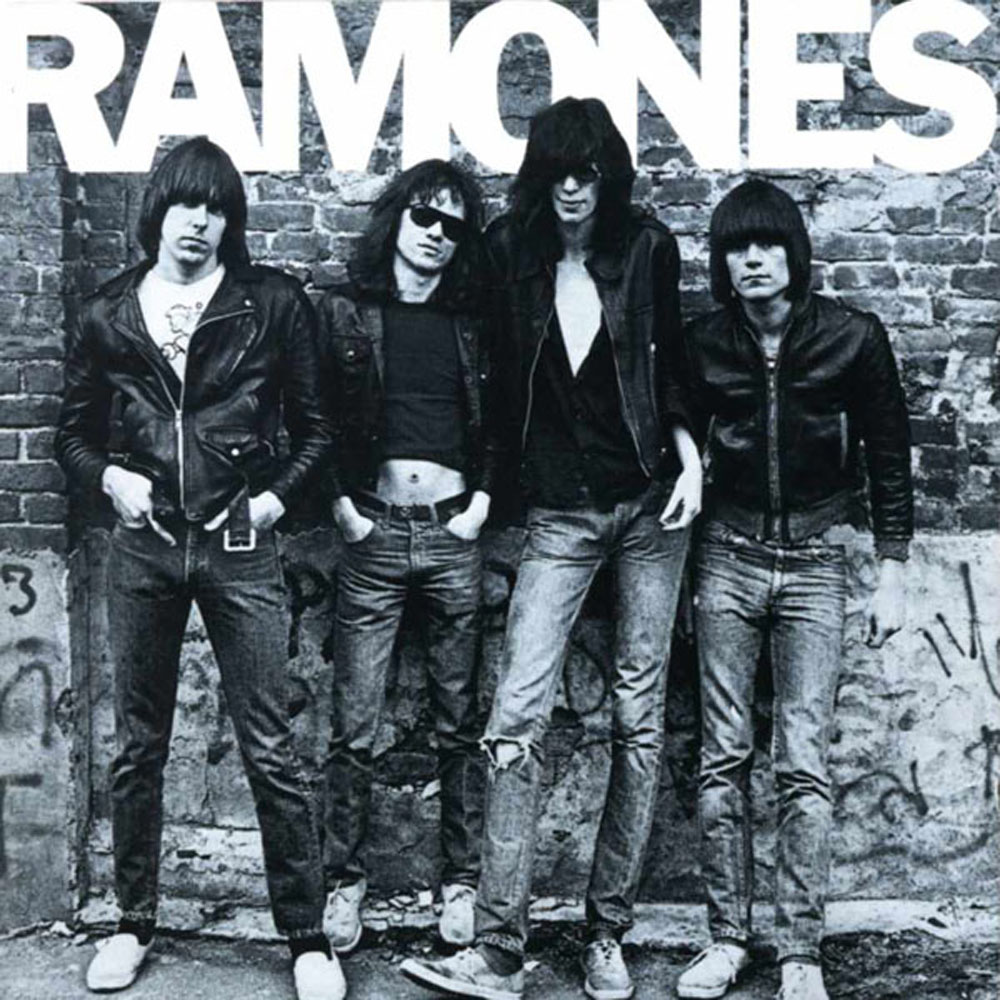Ramones (1976)
I get that sticking this up top implies the band fell down a hill. I acknowledge that due to beefed-up production, records two through four were the true springboard for punk rock. I concede that the Ramones knew this, and whenever they attempted to reclaim older territory, they weren’t harking back to this peculiar mix job. But those caveats make Ramones a singular document. The separation — Dee Dee in the left channel, Johnny in the right, patterned after the Beatles without a second thought — keeps each Ramone at equal power. Tommy is so intent on sturdiness, his highwire deliberation produces melodies by itself. Dee Dee’s nubby bass tone contributes more to the album’s insistence than anything else. (He carries large sections of “Beat On The Brat.”) Johnny’s rhythm style drips impatience: it’s too modulated for rage, too focused for abandon. And Joey caps it all, gargling syllables, pulling all kinds of faces: he’s making a record, and he’s having a blast.
Ramones cleared nothing up for the arthounds who’d seen the boys’ CBGB residency. Some were convinced that the Ramones were making an arch statement, a reification of rock ‘n’ roll insanity; these people usually considered themselves art rockers. Others believed that the Ramones were brain-damaged suburbanites, brutes with a schlock fixation; these people can be found in the pages of Please Kill Me obsessing, twenty years later, about who took more drugs. Still others just thought the whole deal was funny as hell. When Ramones dropped, everyone found something for his or her side. The pace was Herb Washington fast, the tone whipping from insurrectionist to lovestruck to goony. And throughout, there’s a remarkably consistent sonic approach, thanks to a breakneck recording schedule and Craig Leon on the sliders (with assistance from Tommy). The record conjured fevers and obsessions: a Back From The Grave box set on one platter. Saws are revved, drums detonated; a massive pipe organ was shrunk to Ramones size and deployed on a cover of Chris Montez’s manic “Let’s Dance.”
Dumb luck had nothing to do with Ramones, which is essentially a perfect record. Intent on Making It, the band wrote a batch of tunes and gigged them relentlessly; when it came time to record, they were automatic. And when it came to the moment, they delivered. “Blitzkrieg Bop” gives the game away in the title. The chant was a nod to the Bay City Rollers — at one point, they were the competition — but it’s delivered in hiccups. Johnny strangles his way through the changes; Tommy strikes up an oompah beat. Is it about a dance? A riot? Not even the band knows. Even their supporters thought they were one-track creeps, despite songs like “53rd & 3rd” (a first-person account of a Vietnam vet turning tricks, capped by a Dee Dee-sung bridge that might be recorded music’s worst vocal to that point) or “I Don’t Wanna Go Down To The Basement” (an obsessive little sketch that reveals everything by leaving so much unsaid). “Today Your Love, Tomorrow the World” starts as a doom-punk document, then rips itself apart to reveal the most posi of hearts. Seymour Stein was the head of the label, and, like Joey, Jewish. He could’ve quashed Dee Dee’s Nazi imagery, but kept faith in his act. The singer repaid him by hollering those Reich rhymes with insouciance, an evisceration of shock before the triumphant album-ending refrain.
Stein also likely realized that an album like Ramones wouldn’t be big enough to attract controversy. They had so much to say, but their musical vocabulary was only so big. So the record has about 10 alternate-universe hits, scuttled by subject matter or tempo or the vocals. Of course, this sort of situation is catnip to critics. One contemporary publication declared the Ramones were possibly the greatest singles band since the Velvets; they were either sardonic or out of their minds. Today, AcclaimedMusic.net pegs the debut — which, again, was recorded in a week and spawned no hits — as the 38th-most lauded record ever. Of the records that placed higher, only eight are debuts: The Velvet Underground & Nico, Never Mind The Bollocks, Are You Experienced?, Horses, Marquee Moon, The Doors, Funeral, Blue Lines. The Doors aside, pretty good company. When Erdélyi Tamás looked at three high-school classmates, he saw greatness; even better, he nurtured that greatness behind the kit and the boards. When he turned in his leather jacket, the rest of the Ramones were no less committed to their goals than they were on this gamechanging record.






